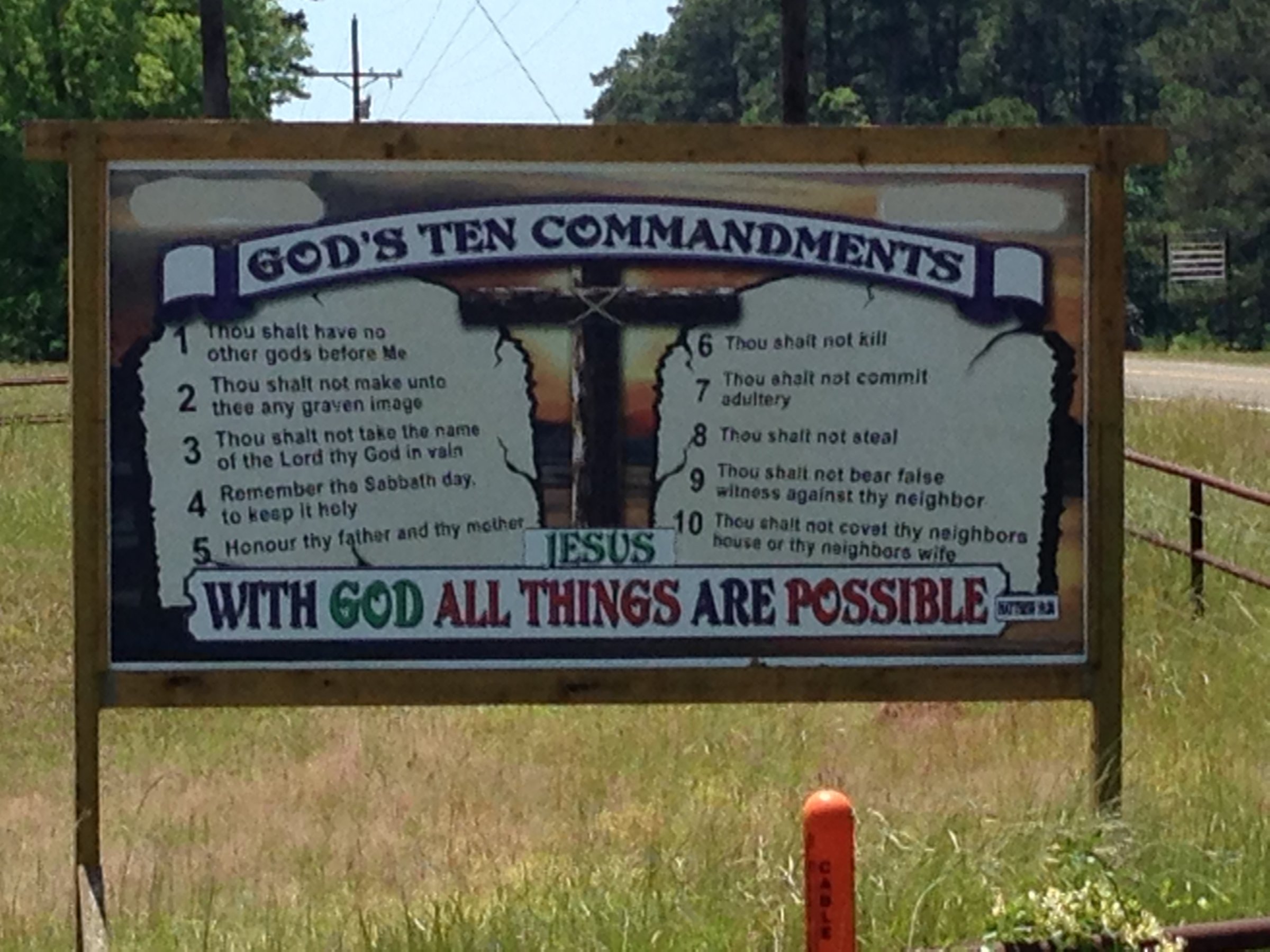
Along rural Highway 21 in East Texas, where cell phone service is patchy at best and the nearest major town is over an hour away, an unassuming 10 Commandments sign sits near an advertisement for a mattress store and a roadside stand hawking jams and jellies. The signs promoting commercial ventures are lawful. The 10 Commandments placard is not.
In August 2013, Jeanette Golden—who pastors a small community church in nearby Hemphill—erected the sign after a couple in her church wanted to do the same but had nowhere to put it. She didn’t think anything of it until earlier this year. That’s when the Texas Department of Transportation sent her a removal notice saying the religious poster was against the law.
“My reaction was told shock,” Golden says via email. “And I immediately felt like they were trying to invade my personal privacy and strip me of my freedom of speech and my freedom of religion. I wondered what law I had broken.”
The broken law was a Department of Transportation code prohibiting signs on personal property, part of state regulations written to comply with the federal Highway Beautification Act that dates back to the 1960s, designed to regulate advertising along Interstates and federally funded highways. But it was a little-known regulation, one that’s raised the ire of many in this deeply-red state that prides itself on individual freedom and religious liberty.
“It was a head-scratching moment,” says the Liberty Institute’s Michael Berry, when he first heard about the banned sign. “The state allows commercial speech but not private speech—even if it’s religiously motivated—on private property.”
The institute, which began representing Golden in April, sent a letter to the department demanding the rule be rescinded, arguing that the code violates the Texas Religious Freedom Restoration Act, the Texas Constitution and the First Amendment. Since then, the agency has put the removal notice on hold and hasn’t done anything to force Golden to remove it.
Department of Transportation spokeswoman Veronica Beyer says officials are currently in the process of rewriting the codes “not for just this case, but for future cases,” and says officials are looking into creating a new classification that would exempt signs that are no bigger than 96 sq. ft. in size, sit on private property and do not promote a business. (Golden’s sign is 72 sq. ft.)
“It’s not a done deal, but this is definitely an exemption that would work in her favor and for a lot other private property owners,” Beyer says, adding that the department doesn’t “regulate content.”
“TxDOT is always concerned about honoring the constitutionally protected rights of its citizens, so property rights, free speech rights and religious rights are always considered important factors,” she says.
The transportation commission will vote on the new regulations at the end of August.
Meanwhile, along Highway 21, Golden’s sign remains in limbo near the legal commercial placards hawking gas and fruit. Residents near Hemphill have been vocal about supporting Golden. A local printing company has created 10 Commandments T-shirts in response. Others in the area are donating money to help support the sign and overturn the law. Golden believes officials will approve the changes, and her 10 Commandments sign will stay put.
“I believe in my heart there will be a change in the rules that will allow me to keep up my sign,” Golden says. “I’m a woman of faith and I believe what it says at the bottom of my sign: With God all things are possible.”
More Must-Reads from TIME
- Cybersecurity Experts Are Sounding the Alarm on DOGE
- Meet the 2025 Women of the Year
- The Harsh Truth About Disability Inclusion
- Why Do More Young Adults Have Cancer?
- Colman Domingo Leads With Radical Love
- How to Get Better at Doing Things Alone
- Michelle Zauner Stares Down the Darkness
Contact us at letters@time.com